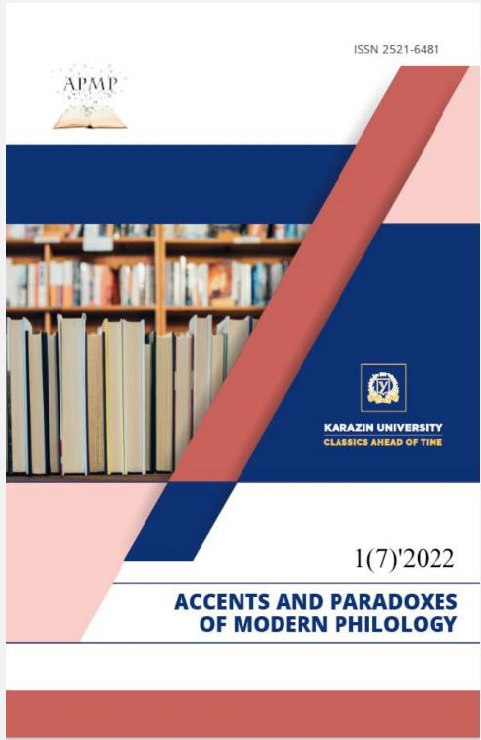JEWISH ASSOL’S WEDDING PLAN, OR ESHET HAIAL BREAKS THE WALLS: AN EXCELLENT WOMAN IN RAMA BURSHTEIN’S LAAVOR AT HA-KIR
Abstract
The article is devoted to American Israeli haredi director Rama Burshtein’s second film Laavor et ha-Kir (הקיר את לעבור,' to break through the wall', Ivrit; in the US: The Wedding
Plan, 2016). The first part of the article (dealing with the conscious part of the author’s mind) is an attempt to reveal and explain the most important biblical and rabbinic sources that the film is based upon. Burshtein's protagonist, Michal, is an Orthodox Jewish yerushalmi spinster in her thirties that desperately wants to get married. She is an active, brave and resourceful lady of faith that represents the best Jewish values. Michal is obviously the chossid חיל אשת) woman of valour, Prov. 31:10), but, for some strange reason, God does
not send her a husband. The excellent wife goes far to get bread (Prov. 31:14), and, likewise, Michal goes as far as her religion allows her (a matchmaker, a healer, Ukraine) to get a great
husband, even if it requires a miracle. “A great miracle was here” in the 2d century B.C.E. for the Macabean rebels and Michal expects a (relatively) small one to happen for her at the same place at the same time 22 centuries later. What she needs to do is to make sure that she has done her part of the job and that she is 100 per cent ready. The second part of the article follows G. K. Chesterton’s advice to the critics not to spend much time dealing with the conscious part of the author’s mind (”which the author himself can express”) but to deal with the subconscious part of the author’s mind and say about the author “the very things that would have made him jump out of his boots.” So, as Ashkenazim came out not only from Egypt, but also from Poland / Ukraine (S. Freud, P. Wexler, М. Dorfman), the critics suggest that in 2016 the Burshteins (cf. burshtyn and bursztyn, amber, in Ukrainian and Polish) staged the modern Jewish version of Scarlet Sails, the Christian feieria composed by the ethnic Pole Aleksandr Grinevski а hundred years earlier. Michal is today’s dati Israeli Assol’. Even if Rama Burshtein is not familiar with A. S. Grin, the argument still stands: the Spirit blows where she wants to make sure that between the true artists of any time there is an unconscious community (T. S. Eliot).
Downloads
References
Dorfman 2008: Dorfman, Michael’. Jews and Life. The Way Jews Descended from Slavs. Moskva: ACT (in Rus).
Dushi 2011: Dushi, Nava. ‘Seeking the Local, Engaging the Global: Women and Religious Oppression in a Minor film’ in: Israeli Cinema Identities in Motion. Austin: University of Texas Press. PP. 213-225.
Freud 1939: Freud, Sigmund. Moses and Monotheism (translated by Katherine Jones). Letchworth: Hogarth Press and the Institute of Psycho-Analysis.
Green 2000: Green, Arthur. These Are The Words. A Vocabulary of Jewish Spiritual Life.
Woodstock: Jewish Lights Publishing, 2000. Grin 1978: Grin, A[leksandr]. S[tepanovich]. Crimson Sails (translated by Fainna Glagoleva) in: Grin, A[leksandr]. Crimson Sails. Moskva: Progress Publishers, 1978. PP. 13-83.
Heilman [1992]: Heilman, Samuel. Defenders of the Faith. Inside Ultra-Orthodox Jewry. New York: Shocken books.
Limmer 2018: Limmer, Seth. Enough, Already! Or, For My Sake The World Was Created [online]. Available at: https://www.chicagosinai.org/worship/sermons/enough-already-or-for-my-sake-theworld-was-created. Accessed 29 Dec., 2021.
Lyukimson 2017: Lukimson, Petr. Rama dlia Dushi [Rama for the Soul] [online]. Available at: https://jewish.ru/ru/people/culture/180281. Accessed 15 Sep., 2021.
M. Sanhedrin in: Mishnayoth. Vol. IV. Order Nezikin. Gateshead: Judaica Press, 1983. The New Jerusalem Bible. Study Edition. London: Darton, Longman and Todd, 1994. A Praise… 1984: [A Praise to a Loving Wife] in: Lyrical Poetry of the Ancient East. Moskva: Nauka. P. 132 (in Rus).
Talmud Bavli, Taanit. New York: Mesorah Publications, n. d (Schottenstein Edition).
Talmon et al. 2011: Talmon, Miri and Yaron Peleg, eds. Israeli Cinema Identities in Motion. Austin: University of Texas Press, 2011.
Wexler 1993: Wexler, Paul. The Ashkenazic Jews: A Slavo-Turkic People in Search of a Jewish Identity. Columbus: Slavica Publishers.




